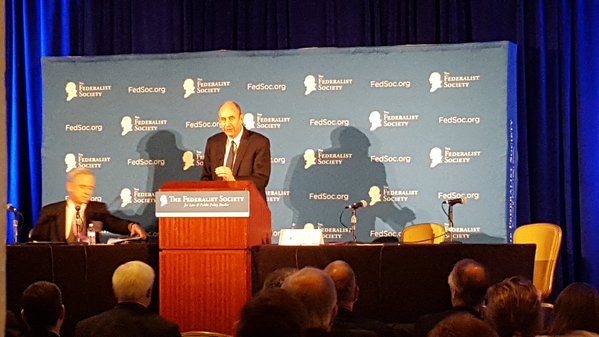During the 2015 Federalist Society Convention, White House Counsel Neil Eggleston graciously offered some remarks on an area where there is a bipartisan consensus–criminal justice reform. Afterwards, my colleague Ilya Shapiro at the Cato Institute asked Eggleston to opine about the process by which the White House seeks advice from the Office of Legal Counsel. Here is a rough paraphrase of Ilya’s question.
It has been reported that at certain points OLC has been asked for opinions, and the White House keeps asking till they get the opinion they want. To take a specific example, for DACA, OLC was only asked for oral advice, and there was a footnote about that in the OLC Opinion. I want to know about process of White House legal analysis, and when a decision is made to ask which lawyers to get approval, and to get things put on paper. This is a process based questions.
Eggleston answered, and highlighted that he valued the opinion of OLC. In particular he personally decided to publish the OLC opinion. Here is my rough transcription of what he said:
You raised a specific example, the immigration executive action. There is an example where we asked OLC for a written opinion. They gave us an opinion as to certain aspects that we could not do, and other aspects we could do. We did the ones OLC said we could do, and didn’t do the ones that OLC said we couldn’t do. There is in the air, a sense that we are not relying on OLC. That is not true. They are a very important partner. They are at the table. I care what they think. They are an important player in the process. I can’t talk about another example. We asked for a written opinion. I made a decision to publish it, because I know there would be interest in the legal analysis for the President and Secretary Johnson. They are definitely at the table. It was thought out. I am enormously appreciative for all they’ve done.

Eggleston did not explain why OLC was only asked for oral advice about DACA, though in fairness he was not at the White House at the time. However, his remarks confirm Charlie Savage’s report in Power Wars that Eggleston personally decided to publish the OLC memo. Today, Eggleston said he did so because he knew the public “would be interest[ed] in the legal analysis for the President and Secretary Johnson.”
Charlie Savage reported:
But Eggleston argued that showing that [OLC Chief Karl] Thompson had said some steps they had considered would not be lawful would show that they had really thought about it and obeyed legal limits. …
This is the high-water mark, Eggleston added. There is never going to be anything more after this. Eggleston directed Thompson to include the negative analysis about parents of “Dreamers” in his formal written memo, which the administration made public.
Eggleston’s remarks also can be viewed as assuaging concerns that OLC has been relegated in this administration (see Jack Goldsmith and Eric Posner). This sense has been so strong that the former and previous leaders of OLC have recently explained how important OLC is.
Thompson made this point obliquely:
“There are a lot of different ways in which OLC gives advice. A very small piece of that is writing formal opinions. The vast majority of our advice is provided informally — is delivered orally or in emails. That is still authoritative. It is still binding by custom and practice in the executive branch. It’s the official view of the office. People are supposed to and do follow it,” Thompson said.
Kudos to Eggleston for speaking to the Federalist Society, and for his willingness to answer questions outside the scope of his prepared remarks. Eggleston quipped that even if he asked people to stay on topic, they wouldn’t. Ilya Shapiro obliged.
Update: National Law Journal offers this report:
Earlier this week, a federal appeals court blocked the rollout of an Obama program that would allow some undocumented immigrants to stay in the country legally. The program, called Deferred Action for Parents of Americans and Lawful Permanent Residents, or DAPA, would allow undocumented immigrants with children who are U.S. citizens and who have lived in the U.S. for several years to seek work visas and stay legally for three years.
One questioner at the Federalist Society event, Ilya Shapiro of the Cato Institute, touched on the controversial program when he asked Eggleston to explain how the administration has used legal advice to decide on executive actions.
Eggleston said that in the case of DAPA, the White House asked the Office of Legal Counsel in the U.S. Department of Justice to weigh in on the program. The administration then followed that advice, which was published by Justice.